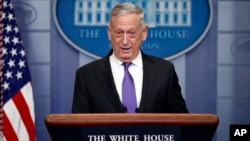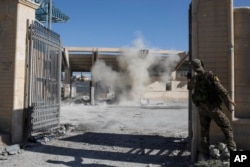The United States and its European allies are divided over the question of what to do with hundreds of Islamic State (IS) foreign fighters who were captured on the battlefields in Syria and Iraq.
While an agreement on how to handle the issue has yet to be made, experts warn of unprecedented challenges as some countries refuse to accept these fighters back into their home countries or are unprepared to deal with them in their criminal justice systems.
The U.S position is that jihadists ought to be tried in their home countries. But the United Kingdom and France have been reluctant to agree to such an arrangement.
A French diplomat speaking on the condition of anonymity told VOA on Friday that his country fears that repatriated French jihadists will use the courts for propaganda purposes and question their impartiality.
The diplomat said the legal issues also are complex for prosecuting jihadists who engaged in acts of terrorism overseas.
“Prosecutions are going to be difficult because the collection of evidence may well be impossible to secure on the battlefields,” he said.
The diplomat also expressed concerns that once in prison, these jihadists will seek to radicalize others.
Another Western official said some countries also feared they would have to reveal their intelligence-gathering sources and methods at trials if the detainees were brought home.
“The fear is they [IS foreign fighters] will argue they were just a cook or something like that, and that their sentence should be lighter,” the official told the Financial Times. “We’ll know that guy was actually a commander or a fighter, for example, but we can’t use the evidence that definitely proves it publicly in court.”
40,000 fighters
An estimated 40,000 fighters from more than 120 countries are believed to have traveled to join the fighting in Iraq and Syria over the years. While thousands died on the battlefield, Western officials say many more thousands have escaped or were captured.
A closed-door meeting between the U.S. and several European defense ministers in Rome on Tuesday failed to reach an agreement on how to deal with hundreds of foreign fighters detained by the U.S.-backed Syrian Democratic Forces (SDF).
On his way to a NATO defense ministerial meeting in Brussels on Tuesday, U.S. Defense Secretary Jim Mattis told reporters that Washington realizes there is no one answer to this issue, but it is imperative to address it as an “international problem.”
“The most important thing is we figure out how we are going to deal with this, that we can deal with it, we don’t paralyze ourselves and just say there is nothing we can do” Mattis said.
U.S. officials are mostly concerned about militants detained by the SDF, arguing that keeping them in northern Syria’s prisons could encourage remaining IS militants to try to break into prisons and free the jihadists.
“These aren’t necessarily the best detention facilities in the sense of they are being held in Syria and not in the most secure area,” Katie Wheelbarger, principal deputy assistant secretary for international security affairs at the U.S. Department of Defense, told reporters traveling with Mattis.
An SDF official earlier this week announced their detention facilities were overwhelmed by captured IS fighters, both foreign and local, and asked foreign governments to take their nationals home.
Nonstate actors
Some analysts, including Nicholas Heras, a Middle East expert at the Center for New American Security, believe the prisoner issue in Syria is also complex because the SDF is a nonstate group that lacks the legal means to extradite the detainees.
“Oftentimes, when it comes to returning the enemy combatants to their country, there is either an understanding or a mechanism that is worked out between the country that captures those combatants and the country where these combatants come from,” Heras told VOA.
“There is no treaty and no agreement between the SDF and these countries where these foreign fighters came from,” he added.
Iraq, as a state with diplomatic missions, however, could extradite foreign fighters, Heras said. But the country suffers from a lack of a functioning and transparent judiciary force.
The United Nations said it was appalled by the mass execution last December of 38 prisoners in Iraq on terrorism-related charges and called for an immediate halt to executions, citing flaws in the country’s criminal justice system.
Similarly, German officials last month protested an Iraqi court decision to sentence a German woman to death by hanging after she was convicted by the court of collaboration with the IS.
Experts say there is also the issue of lawsuits and legal actions against countries for allowing their citizens to be kept in captivity overseas.
Last week, the American Civil Liberties Union filed a lawsuit against Mattis, saying the U.S. military lacked legal authority to detain an American citizen for nearly five months in Iraq without a charge.
The unidentified U.S. citizen who surrendered to the SDF in Syria last year is being held by the U.S. military in Iraq as an enemy combatant for allegedly being an IS fighter.
Revocation of citizenship
Colin P. Clarke, a researcher on terrorism and insurgency at the Rand Corp., said some countries could try to strip foreign militants of citizenship to avoid the legal complexities within their jurisdictions. Such an attempt could further complicate the issue internationally by leaving the suspects stateless, he added.
“It is ... kicking the can down the road, so to speak. They are washing their hands from the responsibility, but then they are leaving this to others to deal with,” Clarke said.
As Western powers are searching for ways to deal with the issue, Clarke warned that the families of foreign fighters present another dilemma.
“Should we consider more punitive measures? Should we be attempting to reintegrate these folks into society?” Clarke asked.







